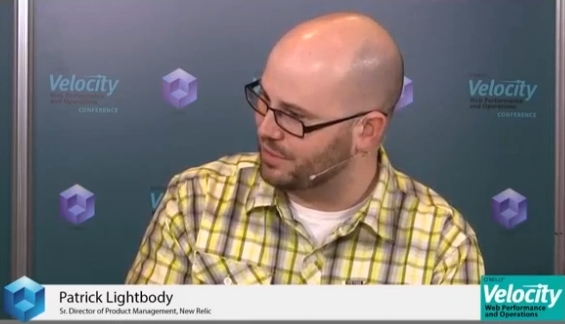 NEWS
NEWS
 NEWS
NEWS
 NEWS
NEWS
![]() John Furrier and Dave Vellante, co-hosts of theCUBE’s flagship interview series, broadcast live from The Velocity Conference on Web Performance and Operations today. They were able to talk to Patrick Lightbody, Senior Director of Product Management with New Relic, a leading provider of web application performance management and monitoring.
John Furrier and Dave Vellante, co-hosts of theCUBE’s flagship interview series, broadcast live from The Velocity Conference on Web Performance and Operations today. They were able to talk to Patrick Lightbody, Senior Director of Product Management with New Relic, a leading provider of web application performance management and monitoring.
Patrick is an avid open source contributor who founded OpenQA, created Selenium Remote Control, and co-created Struts 2. He talked to Furrier and Vellante about web sockets, code and mobile trends. Vellanted asked his opinion on why web sockets seem to be back en vogue. Lightbody believes there’s a confluence of things happening right now. He pointed out that browsers are becoming so much more powerful. To exemplify, he mentioned Epic, the videogaming company, which released the Unreal Engine to run in the browser, entirely in Javascript, with little-to-no-help from the browser. People seem to know they can push the boundaries in the browser, and in doing so there’s the need for the data to be delivered quickly. If you analyze a web page with web sockets going on, nothing shows up, now, despite data flowing back and forth.
Lightbody stated that “code is everywhere now – in the browser, on mobile – but you have to know where your code is and track it all.” Furrier reminded us that the blending of design at the front-end and the infrastructure is not decoupled. They have to be integrated together. One one hand there are coders, who want infrastructure to be like code, then on the other hand there are the infrastructure guys who want to provide services for the coders.
About the trends, Lightbody made an interesting remark: “Software is like the English language. Twenty, thirty years ago, if you wanted to succeed, you had to learn English. Now you have to learn code.”
Mobile has a higher risk profile at the moment because you cannot react quickly to problems happening on those platforms. Web apps allow easier deployment of bug fixes. With that in mind, Lighbody encourages developers to write their apps to respond to change.
The web feels like it’s getting more functional, but is it getting faster? pondered Vellante. Lightbody thinks that expectations continue to rise. The response time is going down, but still the expectations are going up. In terms of evaluating a site’s performance, a user only allows himself a split second.
Speaking of trade-offs, and the theoretical “If I have only one thing to monitor, what would that be?”, Lightbody strongly advises to “start with the user.” Developers need to know where the user is and how he interacts, because that leads to teasing out more areas to focus on.
THANK YOU